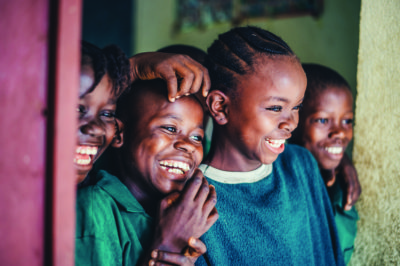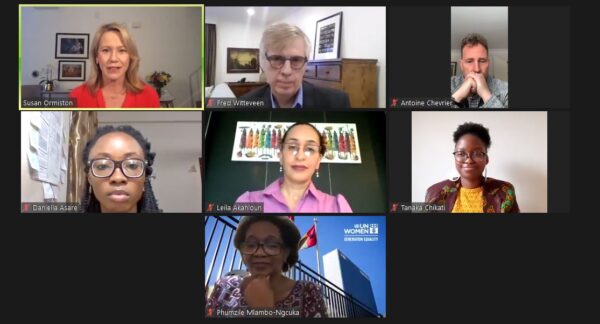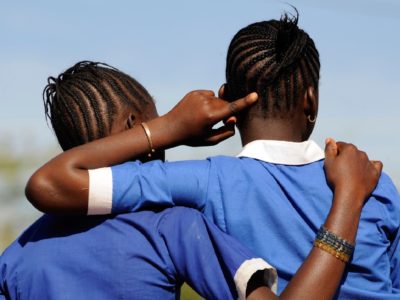“Girls are ready to lead…put girls in charge. You will be pleasantly surprised by what they can do.” This riveting statement made by UN Women’s Executive Director Phumzile Mlambo-Ngcuka captures the essence of the astute and engaging panel discussion on overcoming barriers to education for girls in a COVID-19 world. The online webinar held on February 10th was convened by Children Believe and The Graça Machel Trust.

Stock image.Photo Credit: Annie-Spratt
The session began with opening remarks from a representative from the Graça Machel Trust Ms Leila Akahloun, who read the remarks in her capacity as Mrs. Graça Machel’s Special Advisor.
The statement mentioned how the COVID-19 pandemic continuous to amplify not only existing challenges, but also threatens much of the gains made in girls’ education. It further emphasized the need to place the needs and aspirations of children at the centre of any recovery and reconstruction interventions being made in response to the pandemic COVID-19.
These sentiments were echoed by the eclectic panelists’ that featured Canadian and African perspectives from sector leaders, government officials and youth, including UN Women’s Phumzile Mlambo-Ngcuka, Children Believe’s Fred Witteveen and Tanaka Chikati from the Graça Machel Program and African Leadership Academy.
“Education is never a waste… schools are not just about learning, and they are part of the infrastructure that makes societies function. Schools need the status for an essential service,” added Ms Mlambo-Ngcuka.

The Children Believe and GMT virtual panel, featuring Canadian and African perspectives from sector leaders, government officials and youth.
Moderated by CBC’s Susan Ormiston, the discussion also covered a range of issues including child marriage, low social value towards girls, the burden of care, the digital gender divide, female genital mutilation, protecting and providing education services during the pandemic, gender-Based violence both online and in-person, mentorship, mental health, barriers children and youth with disabilities face alongside those children in protracted and forced displacement and the need for intersectionality.
Antoine Chevrier from Global Affairs Canada gave some sound advice to development partners working in the different sectors of intervention such as listening and learning from others. “To listen and learn from those in the different situations to understand the full scope and complexities of the challenges they face. ”- Antoine Chevrier.

Chevrier’s statement paid credence to another announcement made in Mrs Machel’s speech on the Graça Machel Trust’s development of a movement focused on nurturing the innate power of African adolescent girls. The movement seeks to address the societal barriers that impede on their holistic socio-economic development and transform society at large.
“I firmly believe adolescents are valuable drivers of social transformation and economic development, and essential in building prosperous, healthier, safer, and more peaceful societies,” Mrs Graça Machel.
Watch the full Webinar Here.










 The Trust supports and mobilises civil society networks on issues of ending child marriage, ending violence against children, ending female genital mutilation and promoting children’s rights, to carry out advocacy and action across Africa. Special focus is placed on Malawi, Mozambique, Tanzania and Zambia where child marriage continues to be a problem largely driven by poverty, gender inequality, harmful traditional practices, conflict, low levels of literacy, limited opportunities for girls and weak or non-existent protective and preventive legal frameworks.
The Trust supports and mobilises civil society networks on issues of ending child marriage, ending violence against children, ending female genital mutilation and promoting children’s rights, to carry out advocacy and action across Africa. Special focus is placed on Malawi, Mozambique, Tanzania and Zambia where child marriage continues to be a problem largely driven by poverty, gender inequality, harmful traditional practices, conflict, low levels of literacy, limited opportunities for girls and weak or non-existent protective and preventive legal frameworks.




 Education is a fundamental right for all children, which is also a vehicle for social, economic and political transformation in communities, countries and the African continent at large. Recent studies indicate a lack of progress in some of the critical commitments aimed at improving education quality, access, retention and achievement, particularly for girls. In most African countries, girls may face barriers to learning, especially when they reach post-primary levels of education. By implementing multi-dimensional approaches to education which includes core education, personal development, life skills and economic competencies, the Trust partners with funding partners, governments, civil societies and the private sector to improve education access.
Education is a fundamental right for all children, which is also a vehicle for social, economic and political transformation in communities, countries and the African continent at large. Recent studies indicate a lack of progress in some of the critical commitments aimed at improving education quality, access, retention and achievement, particularly for girls. In most African countries, girls may face barriers to learning, especially when they reach post-primary levels of education. By implementing multi-dimensional approaches to education which includes core education, personal development, life skills and economic competencies, the Trust partners with funding partners, governments, civil societies and the private sector to improve education access.

 The Nutrition and Reproductive, Maternal, New-born, Child and Adolescent Health and Nutrition, (RMNCAH+N) of the Children’s Rights and Development Programme aims at promoting the Global Strategy for women, children and adolescents’ health within the Sustainable Development Goals (SDG) agenda. The strategy emphasises on the importance of effective country leadership as a common factor across countries making progress in improving the health of women, children and adolescents.
The Nutrition and Reproductive, Maternal, New-born, Child and Adolescent Health and Nutrition, (RMNCAH+N) of the Children’s Rights and Development Programme aims at promoting the Global Strategy for women, children and adolescents’ health within the Sustainable Development Goals (SDG) agenda. The strategy emphasises on the importance of effective country leadership as a common factor across countries making progress in improving the health of women, children and adolescents. Through its Early Childhood Development (ECD) plan, The Trust will seek to put into action the new science and evidence Report that was presented by Lancet Series on Good and early development – the right of every child. This will be achieved by mobilising like-minded partners to contribute in the new science and evidence to reach all young children with ECD. The Trust’s goal is to be a catalyst for doing things differently, in particular, to rid fragmentation and lack of coordination across ECD sectors. In response to evidence showing the importance of political will in turning the tide against the current poor access and quality of ECD. Even before conception, starting with a mother’s health and social economic conditions, the early years of a child’s life form a fundamental foundation that determines whether a child will survive and thrive optimally.
Through its Early Childhood Development (ECD) plan, The Trust will seek to put into action the new science and evidence Report that was presented by Lancet Series on Good and early development – the right of every child. This will be achieved by mobilising like-minded partners to contribute in the new science and evidence to reach all young children with ECD. The Trust’s goal is to be a catalyst for doing things differently, in particular, to rid fragmentation and lack of coordination across ECD sectors. In response to evidence showing the importance of political will in turning the tide against the current poor access and quality of ECD. Even before conception, starting with a mother’s health and social economic conditions, the early years of a child’s life form a fundamental foundation that determines whether a child will survive and thrive optimally.